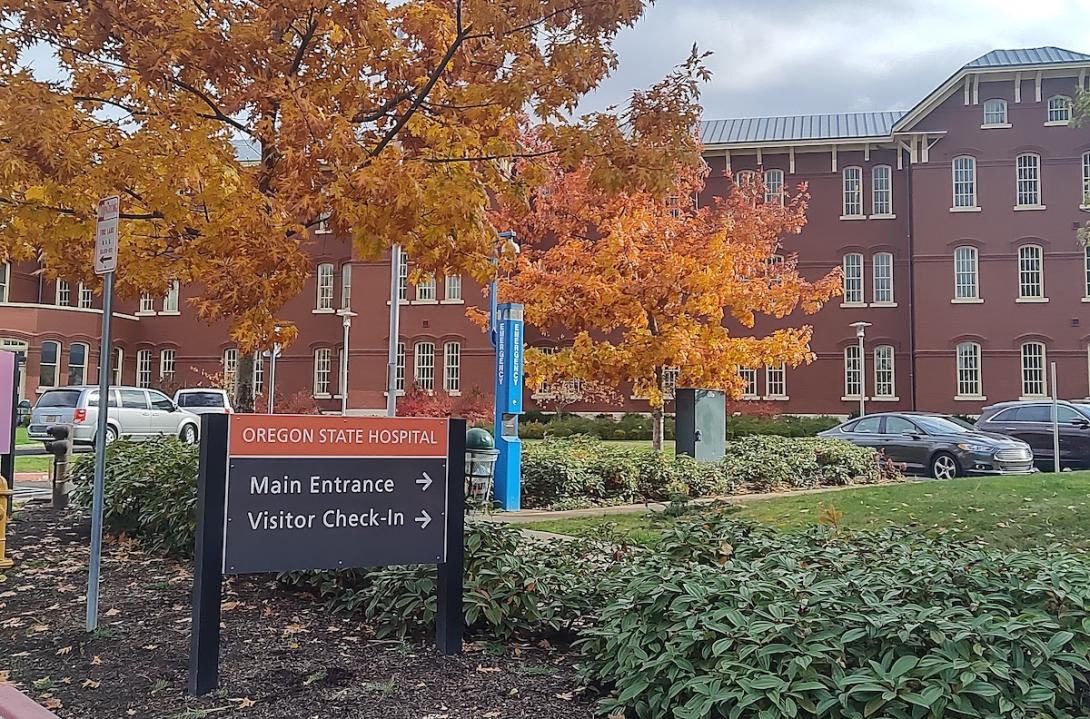
A new unit opened at Oregon State Hospital’s Junction City campus this week, paving the way for another two dozen patients to get residential services.
For the state-run psychiatric hospital, it represents a step forward in efforts to unclog the bottleneck of patients who need services. Yet in the big picture, deep needs persist in the state’s behavioral health care landscape, both at the hospital and for other providers. The COVID-19 pandemic has exposed fault lines in the behavioral health system that widened amid a demand for service, workforce shortage and shifting financial challenges.
State lawmakers on the House Behavioral Health Committee are eying the upcoming short session in February as they look for ways to keep the system intact. The challenges come as Oregon works on long-term structural changes to behavioral health. For example, officials are setting up a 9-8-8 phone line that will send crisis response teams made up of trained social workers and specialists to help people in the midst of a behavioral health crisis rather than law enforcement. The state’s also setting up addiction treatment centers due to the passage of Ballot Measure 110, which decriminalized low-level drug possession charges with a shift in focus toward treatment.
Immediate Needs Persist
Even amid plans that could transform the landscape, state leaders also are scrambling for ways to stop workers from exiting the system.
“Just like the rest of health care, the pandemic has had a lot of wear and tear on all of us,” Oregon Health Authority Behavioral Health Director Steve Allen told the House Behavioral Health Committee on Tuesday.
The state recently made $15 million in federal funding available to residential behavioral health providers for recruitment and retention bonuses for employees and other incentives, such as help with childcare expenses.
“Checks are already in the mail," Allen said.
If money is left over, Allen said, he’d like to see it expand to other providers besides residential care providers, such as mobile crisis teams.
The state was able to provide vacancy payments to providers forced to downsize beds during the pandemic due to the federal Centers for Medicare and Medicaid Services’ emergency declaration. That’s provided $30 million for providers since July 2020. Those payments will continue until at least Dec. 31, though CMS could extend the declaration.
However, Allen said, providers are looking for predictable funding.
“All of these measures help buy us some time as we work on the transformational pieces,” Allen said.
Oregon State Hospital
Oregon State Hospital officials on Wednesday announced the opening of a 24-bed unit at the facility’s Junction City campus. The state-run hospital has a main campus in Salem and another in Junction City.
Eight patients arrived on Monday and another 16 arrived on Wednesday and the unit is aimed at treating people who are found guilty except for insanity in criminal cases.
The Junction City campus received $31 million in the 2021-2023 budget cycle to open two units. The second 24-bed unit will open in early 2022 if adequate staffing is available, hospital officials said. The $31 million represents 110 more positions, which is 51 staff on each unit and eight support staffers.The new unit has a mix of new hires, temporary agency nurses and existing staff until permanent employees are found.
At the same time, however, turnover has increased. The voluntary departures of staff hit 27.4 per month this year, for the period covering January through September. That’s the highest peak since 2017, when the average monthly voluntary departures was 22.5, according to data Oregon State Hospital superintendent Dolly Matteucci presented to lawmakers.
Challenges include the national health care workforce shortage, the stressful work environment of state hospitals and a competitive market for health care workers, Matteucci said.
The new units, however, are just a start. Matteucci reminded lawakers that the state hospital has submitted a proposal to the Legislature’s budget committee that seeks $33.5 million for this two-year budget cycle to add nearly 500 more permanent positions to the hospital. That’s a combination of 359 new positions and turning 134 unbudgeted positions into permanent positions.
Yet Oregon State Hospital is just one part of a larger behavioral health system. Chris Bouneff, an advocate and executive director of the National Alliance on Mental Illness, or NAMI, Oregon, said efforts like the new unit at the state hospital helps, but isn’t enough.The system won’t transform the way it needs to until community services are built out to help people, he said.
Lawmakers Weigh-In
Lawmakers on the committee said they want to do what they can during the short session.
“I think it’s important we recognize where we are,” said Rep. Tawna Sanchez, D-North/NE Portland and the committee chair.
In a recent interview with The Lund Report, Sanchez said the big picture concerns include where to provide services for people and the barriers that prevent people from entering the field or encourage them to leave the field.
“We don’t have places for people to go if they are in a mental health crisis,” Sanchez said. “Those things don’t exist the way they need to.”
In the long-term, Sanchez said, the state needs to have systems that deal with mental health crises right away. She’s hopeful that systems like the 9-8-8 suicide prevention line will be part of that solution.
For the short session, options on the table include a planned bill that would set up a program for behavioral health providers to get a loan for short-term workforce needs like employee bonuses or time off. Rep. Rob Nosse, D-Portland, said he supports that concept, saying the program would allow providers to get the loan forgiven if they spend the funding properly and go to other types of providers beyond the residential providers.
Rep. Boomer Wright, R-Coos Bay, said he’s interested in a legislative concept aimed at ensuring people get a thorough evaluation when they go to a hospital emergency room during a mental health crisis.
In his district, he said, if a person is considered a danger to themselves, they’ll be quickly released after the police or a crisis team takes them to a local hospital.
“They place them back on the street in a couple hours,” he said.
You can reach Ben Botkin at [email protected] or via Twitter @BenBotkin1.
